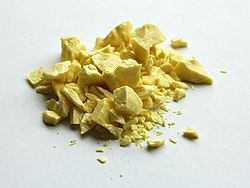
This dilemma
emerged in a tutorial this week where we were discussing the correct spelling
of the word. Historically sulphur has been the typical form in
British English, while sulfur is usual
in American English, having emerged as a variant spelling among chemists in the
1920s. The word was borrowed into
English from a French word sufere
during the medieval period, which in turn was adopted from Latin, where the
word was spelled both sulphur and sulfur.
Usually English words spelled with <ph> are derived from Greek,
where the <ph> represents the Greek letter ‘phi’, but in this case the
ultimate source of the word is Arabic.
This might
all seem pretty straightforward; the reason for the confusion in our class
concerned the question of the correct spelling of the word in the international
chemical industry. One student reported
that a friend had told him that the only acceptable spelling of the word among
chemists was now sulfur. To settle the debate, another class member
texted her father, who conveniently happens to be a nuclear physicist, who
reported that he continues to use the spelling sulphur. The International
Union of Pure and Applied Chemistry did indeed officially adopt the sulfur spelling in 1990; in 1992 the
Royal Society of Chemistry followed suit, issuing a press release adopting sulfur as the official international
nomenclature for atomic element 16. But
while this might seem to settle the case once and for all, it’s clear from our
discussion that not all practising scientists have adopted the spelling
change. This is a good example of the
difficulties of reforming established spellings, even in a relatively defined
group of users. One solution would be to
drop the word completely, in favour of the much more evocative Germanic
equivalent brimstone
(literally ‘burning stone’).